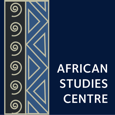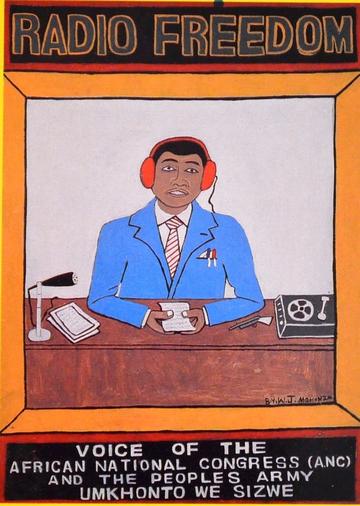Radio in Southern Africa: Past and Present
'Radio in Southern Africa: Past and Present'
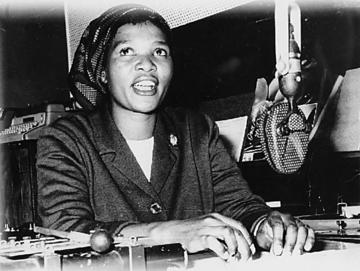
A joint symposium held by the African Studies Centre, University of Oxford and the Department of Communication and Media Studies, University of Johannesburg
Convenor: Dr. Peter Brooke
Thursday 12 May 2022, 11.30 am - 5.45 pm BST
Investcorp Lecture Theatre, St Antony’s College and online, followed by drinks reception
This one-day research event brings together leading scholars from UK and Southern Africa on political, social and cultural aspects of radio broadcasting and listening in the region, both past and present. The symposium culminates in a keynote lecture by Prof. Liz Gunner, the foremost historian of South African radio broadcasting during and after the apartheid era.
If you wish to join the event online please follow this link:
11.30 - 13.00: Radio Past
Chair: Miles Larmer
The ANC’s Radio Freedom in Zambia, 1967-1992, Sekibakiba Lekgoathi (University of Witwatersrand)
Despite significant scholarly attention given to the issue of international solidarity with the liberation movements in South Africa during the struggle against apartheid, the role of communication technology has continued to receive minuscule recognition. Lack of knowledge in South Africa about the role that the international community in general, and Africa in particular, played in supporting the fight against apartheid tends to contribute to ignorance that directly or indirectly fuels xenophobia, or more accurately Afrophobia, in South Africa. Production of knowledge on the role played by Zambia in the struggle against apartheid could assist in deepening knowledge and decreasing misunderstanding and mistrust. This paper is based on a combination of archival evidence (audio/sound and documentary sources) – both in South Africa and Zambia, and interviews conducted with Radio Freedom and Zambian Broadcasting Service (ZBS) and Zambian National Broadcasting Corporation (ZNBC) broadcasters (current and retired) and other media workers. The argument is twofold: Firstly, I argue that Zambia’s support for the ANC’s Radio Freedom, which was quite substantial particularly in the years after the June 16th 1976 Soweto students uprising, was part of a wider struggle and solidarity with the liberation movements in Southern Africa against White racist regimes in the southern African region. Secondly, through support in the form of airtime and equipment on the external services of ZBS/ZNBC, Zambia made it possible for Radio Freedom to link up with their supporters inside the boundaries of South Africa who were able to tune in despite the illegality of that act. Thanks to the support given by the Frontline States such as Zambia, Radio Freedom was able to connect with the support base of the liberation movement inside the country and to shape the course of the unfolding struggle and internal political developments.
Cosmopolitanism and Subversion: Transnational radio audiences in Southern Africa, Peter Brooke (University of Oxford)
This paper analyses the transnational impact of national radio stations on politics and culture across Southern Africa from the 1960s to the 1990s. I argue that in the context of the region’s protracted liberation struggles, state broadcasters sought to transcend national boundaries and to win regional audiences as a tool of ‘soft power’ by using powerful short-wave transmitters. Settler colonialism and national liberation entered into a noisy and prolonged media war, only comparable in its intensity and duration to the Cold War battle to control the airwaves over Eastern Europe. With such a wide range of foreign stations on offer, audiences developed a distinctively cosmopolitan listening culture that subverted the attempts of nation states to retain the firm control of the media which had characterised the colonial period. My paper concludes that the combination of regional ideological conflict, short-wave transmission and the rise of the transistor weakened the hold of nation states on the region’s media landscape and gave rise to a transnational media culture that prefigured the later internet age.
Radio and Music reception in colonial Mozambique: the Goan experience, Catarina Valdigem (Universidade Catolica Portuguesa, Lisbon)
"As a violinist, my father would make me listen to classical music. What a pain, my goodness! And I would stay and listen to it with him…..but I grew such an aversion towards the violin that you can't imagine!" With these words, Alberto would demarcate himself from his father. Although they were both born in Goa, Alberto wouldn't share his father's musical tastes. While the father had had an informal musical education in the Church in Goa, endorsed by the Portuguese colonial regime, Alberto did not have the chance to learn – or like - the violin as he migrated as a young boy to colonial Mozambique in 1961. Although he settled in a Portuguese colony, he started listening to what he called "modern music" on the B station of the Radio Clube de Moçambique (RCM), voiced in the English language.
The RCM dominated the broadcasting panorama in colonial Mozambique. This private Radio station had strong alliances with the Portuguese colonial government, hence voicing the regime's ideology. The RCM constituted a tool of the Portuguese colonial empire and endorsed the construction of imperial identities across the territory, despite operating as a commercial station and having a substantial south-African listenership. The extent to which it reshaped the identities of non-white populations with migratory experiences across the Portuguese colonial empire is still a question to be addressed.
In this paper, I explore the role of radio and music reception in re-signifying the imperial identities of the population of Goan origins, either born or migrated to colonial Mozambique. I draw on 11 in-depth interviews with Portuguese and Mozambicans of Goan origins who have lived in colonial Mozambique for ten or more years. My goal is two-folded: a) first, to rethink the role of radio and music reception in the construction of imperial identities in that Portuguese colonial context; b) second, to address the diversity of Portuguese imperial identities produced in the Mozambican colonial setting through radio and music reception, by looking into the Goan experience.
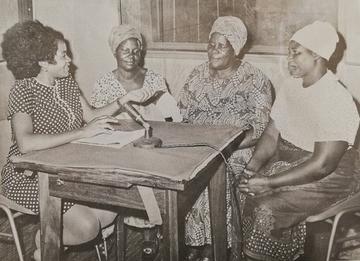
Source: Zambia Broadcasting Services (Lusaka, 1976)
14.30 – 16.30: Radio Present
Chair: Rebekah Lee
Radio in Zimbabwe, Tinashe Mushakavanhu (University of Oxford)
The limits of governmentality: call-in radio and the failure of neoliberal evangelism in Zambia, Alastair Fraser (School of Oriental and African Studies)
The spread of mobile telephones in Africa and the resulting possibilities for interactive and social media to effect political change have excited aid donors, state authorities and international NGOs. In some countries these agencies now pay for a large share of call-in radio programming, facilitating public debates that, they claim, improve governance. Foucauldian criticism of such participatory initiatives suggests that they facilitate ‘neoliberal governmentality’, depoliticising public debate and disciplining rather than liberating the political agency of the majority. This article argues that winning acceptance of market-oriented, technocratic governance is not so easy. It develops an in-depth case of one Zambian call-in radio programme, ‘Let’s Be Responsible Citizens’ and shows that the aims of Lusaka City Council, which paid an independent radio station to make the programme, included increasing residents’ compliance with privatised systems for distributing social goods, and enabling technocrats to better surveil and discipline the city’s unruly spaces. The programme was, in other words, conceived as Foucauldians might suppose. However, the article then emphasises the agency of audiences and journalists, laying out how callers to the show and, in response, its host, gradually subverted the council’s agenda, using the programme to enact a politics of resistance in which ‘responsible citizens’ were those challenging their haughty representatives and criticizing privatisation. The article thus contributes to two emerging literatures, those on the political effects of interactive broadcasting in Africa, and on the relationship between neoliberalism and popular subjectivities.
Radio, Democracy and Citizenship in South Africa, Tanya Bosch (University of Cape Town)
This paper reflects on the potential for radio in South Africa to offer a space for democratic dialogue. Via an exploration of various types of radio station in South Africa – more specifically the public broadcaster, commercial talk radio and community radio – the paper argues for radio as a public sphere, in a Habermasian sense. Radio plays a key role in the formation of publics as well as subaltern counter-publics; and as such stations become public discursive arenas where social identities can be constructed, deconstructed and reconstructed. In the absence of any other similar space, South African radio stations facilitate discursive dialogue and debate directed by a plurality of perspectives across geographically and politically diverse audiences. The paper draws on a qualitative content analysis of radio station content to argue that the South African radio landscape can be seen as a democratic public sphere as listeners participate to express cultural and political citizenship.
Decolonising African Radio, Winston Mano (University of Westminster)
The paper argues for decolonising radio in Africa from an Afrokological standpoint. While it is beyond doubt that radio is the most popular medium in Africa, what has not been discussed is why and how it ought to be decolonised. The paper uses Afrokology to develop a critical engagement with existing radio that critiques and pushes back on irrelevant epistemes and frameworks. The decolonial approach also unmasks the incompleteness of dominant approaches to radio coming from the global North. The paper invokes Afrokology as heuristic tool to centre African epistemes and forge African radio from a decolonial African/global South perspective, in tandem with African lived realities. A decolonial turn for radio approach embraces rather than shuns the ever-increasing complexity and diversity of life on the continent. It uses Afrokological building blocks based on incompleteness, conviviality, and relational accountability, with an emphasis on establishing more relevant and responsive African radio (Mano and Milton, 2021). Decolonising radio helps establish African radio from local vantage point.
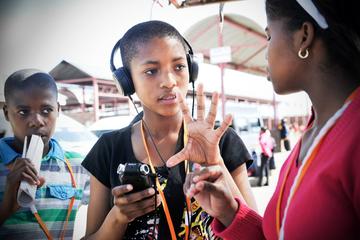
© Children's Radio Foundation/2012/Lerato Maduna
16.45 – 17.45: Keynote Address
Chair: Peter Brooke
Beyond the Static. Woman, Voice and Radio Zulu in the 1980s
Prof. Liz Gunner (University of Johannesburg)

